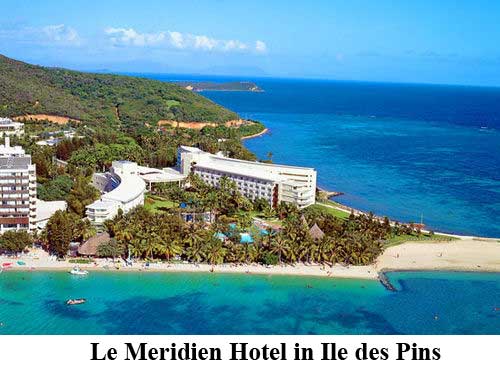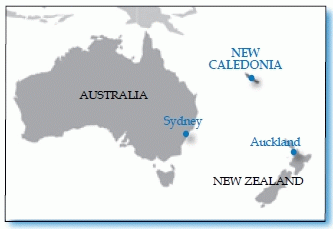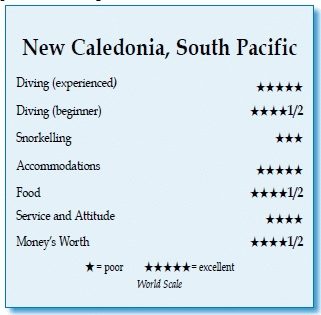New Caledonia, South PacificContents of this Issue: Hawk’s Nest Lodge, Cat Island, The Bahamas Fiji Airways: A Major Link in the Shark Fin Trade What to Tip on Your Next Dive Trip: Part II “Now I Can Pig Out on Trips with Less Guilt” Why Some Indonesia Liveaboards Don’t Take Credit Cards Will Honduras End Scuba Diving for Lobster? Are You Getting Free Gear to Review? Whale Sharks Are Getting Too Much Love Editorial Office: Ben Davison Publisher and Editor Undercurrent 3020 Bridgeway, Suite 102 Sausalito, CA 94965 an utter lack of Americans, an abundance of pristine dive sites from the June, 2013 issue of Undercurrent
Dear Fellow Diver: New Caledonia can be summed up in two words: remote and fascinating. American visitors are rare (they're mostly French, Japanese and Korean and a few Aussies), and that's a pity. A French island of 250,000 people that's 1,000 miles northeast of Australia, New Caledonia boasts the world's largest coral lagoon. Almost 1,000 miles of fringing reef surround the 250 mile-long island, and it's mostly untouched. My wife and I visited in December for 11 days, our goal being to dive what are considered three of the best destinations: Noumea, Hienghene and the Isle des Pins (we didn't have enough time to visit the island of Lifou). Noumea, the capital city and home to two-thirds of the population, is upscale and modern, thanks to high wages paid by the nickel-mining industry. I rented a car at the airport, 30 miles north of town. Roads are excellent. Of the many fine hotels in Noumea, I chose Le Meridien, which is on the lovely Anse Vata beach and offers package deals with its sister hotel on Isle des Pins. All the restaurants I tried were good (this is part of France, after all), my favorite being Le P'Tit Café, a 15-minute drive from Le Meridien.
My first dive was a drift at the Passe, followed by a 60-foot dive at the Mur aux Loches site, an amazing wall about 100 yards long and 60 feet high, and frequented by dozens of white-tip sharks, very similar in numbers to those at the Blue Corner in Palau. The two one-hour dives were great, but the rough, pounding Zodiac rides to and from were trying, at best.
The Babou Cote Ocean dive center was a mile away. We used our rental car, but the hotel will ferry guests, too. Dive sites were, once again, a 20- to 30-minute ride to the outer reefs, but with near dead calm seas all three days, the rides were enjoyable on Babou's covered, seaworthy boats We saw dugungs and dolphins on the rides in and out, and Hienghene's outer reef was as nice as it gets. We dove the "Cathedrale" dive site twice, a wonderful series of underwater ravines, caverns tunnels and caves. Thousands of tiny reef fish of every conceivable color swarmed near the tops of the reef. Anemone clownfish were abundant, and I even swam near a five-foot grouper. Both hard and soft corals were extremely healthy everywhere, testament to the small population of the island that hasn't polluted its shores. Babou was such a friendly, laid-back dive operator, that I'm sure I could probably have convinced them to ad lib and take us to out-of-the-way dive sites. The staff spoke better English than those in Noumea.
New Caledonia is environmentally fascinating, both above and below water. I've made more than 500 dives in such destinations as Tahiti, Fiji, Palau, and Vietnam, and this rates at the top of the South Pacific destinations list. It's expensive to get there, expensive to stay and a long trip, but I found it completely worthwhile. What also made it exotic was the lack of Americans. I booked through South Pacific Adventure in Boulder, CO, which specializes in South Pacific destinations, but this was the first time they had booked a New Caledonia trip, which gives you an idea of how off-the-map it is. Because I want to see more of the diving, I hope to find a scuba-equipped sailboat, because my hunch is there are plenty of pristine dive sites for 1,000 miles along the barrier reef. -- A.P.
|

I want to get all the stories! Tell me how I can become an Undercurrent Online Member and get online access to all the articles of Undercurrent as well as thousands of first hand reports on dive operations world-wide
| Home | Online Members Area | My Account |
Login
|
Join
|
| Travel Index |
Dive Resort & Liveaboard Reviews
|
Featured Reports
|
Recent
Issues
|
Back Issues
|
|
Dive Gear
Index
|
Health/Safety Index
|
Environment & Misc.
Index
|
Seasonal Planner
|
Blogs
|
Free Articles
|
Book Picks
|
News
|
|
Special Offers
|
RSS
|
FAQ
|
About Us
|
Contact Us
|
Links
|
3020 Bridgeway, Ste 102, Sausalito, Ca 94965
All rights reserved.

 Due to time constraints, we dove just one day in Noumea with Abyss Plongee.
The dives that day were at Passe de Dumbea, a 25-minute Zodiac ride from the
harbor. Because the Zodiacs are uncovered, it was a rough and wet ride. The
crew helped set up and handle our gear (I had my own gear, my wife rented). The
divemasters were friendly but rushed through dive briefings. Some speak limited
English, so it was tough for some to understand instructions and I too, had
difficulties, though I speak fluent French. However, enough English is spoken
at hotels, restaurants, etc., that it is not difficult for a diver who doesn't
speak French to have an enjoyable experience. (Dive package tours are available
through Australian outfitters.)
Due to time constraints, we dove just one day in Noumea with Abyss Plongee.
The dives that day were at Passe de Dumbea, a 25-minute Zodiac ride from the
harbor. Because the Zodiacs are uncovered, it was a rough and wet ride. The
crew helped set up and handle our gear (I had my own gear, my wife rented). The
divemasters were friendly but rushed through dive briefings. Some speak limited
English, so it was tough for some to understand instructions and I too, had
difficulties, though I speak fluent French. However, enough English is spoken
at hotels, restaurants, etc., that it is not difficult for a diver who doesn't
speak French to have an enjoyable experience. (Dive package tours are available
through Australian outfitters.) From Noumea, we drove eight hours
through spectacular mountains, rainforests
and nickel mines to Hienghene on the northeast
coast (there is a shorter five-hour drive via Kone). We stayed at Koulnoue
Village, a former Club Med, featuring
round "bungalows" designed like native
huts on lovely grounds full of fruit
trees. Rooms are small, but have most
amenities, including cable TV (CNN in
English), refrigerators and air conditioning.
It's a touristy resort, with a
swimming pool, golf driving range, kayaking,
okay beach snorkeling, and miles
of trails to explore. All meals were
buffet, and featured a wide and everchanging
variety of fresh meat, fish,
veggies, salad and dessert courses each
day. Lots of lychee, an island staple.
Breakfast buffets also featured a variety
of selections. Because the dive
boats usually return after lunch, we made sandwiches from the breakfast buffet to
take with us.
From Noumea, we drove eight hours
through spectacular mountains, rainforests
and nickel mines to Hienghene on the northeast
coast (there is a shorter five-hour drive via Kone). We stayed at Koulnoue
Village, a former Club Med, featuring
round "bungalows" designed like native
huts on lovely grounds full of fruit
trees. Rooms are small, but have most
amenities, including cable TV (CNN in
English), refrigerators and air conditioning.
It's a touristy resort, with a
swimming pool, golf driving range, kayaking,
okay beach snorkeling, and miles
of trails to explore. All meals were
buffet, and featured a wide and everchanging
variety of fresh meat, fish,
veggies, salad and dessert courses each
day. Lots of lychee, an island staple.
Breakfast buffets also featured a variety
of selections. Because the dive
boats usually return after lunch, we made sandwiches from the breakfast buffet to
take with us. After a drive back to Noumea, we flew to Isle des Pins, southeast of the
main island, famous for its beautiful beaches and forests of Norfolk Island pine.
Because it receives the prevailing southeast winds from New Zealand, water temperatures
were cooler -- 74 to 75 degrees, whereas in Noumea and Hienghene, it
averaged 77 degrees. I longed for a 3mm wetsuit, a better fit here than the
1mms we used up north. The Le Meridien, on a huge interior lagoon sheltered
from the main ocean (perfect for snorkeling), is luxury incarnate. The beautifully
appointed rooms had all the amenities
-- TV, CD music system, refrigerator,
luxury bathrobes and beautiful
bathrooms. Dining was a mix of high-end
French, Asian and seafood cuisine. The
Kunie scuba center, the only dive operation
on the island, is a 20-minute (and
$30) van ride from the hotel. Nico, the
likeable owner, is what the French call
"tres sympathique." Diving was similar
to Noumea and Hienghene, with a wide
variety of every sort of marine life,
even sea snakes! Visibility was 100-
plus feet, but not quite as good as at
Hienghene, where the dead-calm days made
for sparkling- clear water. Most dives
were 60 to 90 feet, and the boat ride
is only 10 minutes from the dive center.
The sites are near several small
islands, so we were welcome to go ashore
between dives if the ocean got rough.
After a drive back to Noumea, we flew to Isle des Pins, southeast of the
main island, famous for its beautiful beaches and forests of Norfolk Island pine.
Because it receives the prevailing southeast winds from New Zealand, water temperatures
were cooler -- 74 to 75 degrees, whereas in Noumea and Hienghene, it
averaged 77 degrees. I longed for a 3mm wetsuit, a better fit here than the
1mms we used up north. The Le Meridien, on a huge interior lagoon sheltered
from the main ocean (perfect for snorkeling), is luxury incarnate. The beautifully
appointed rooms had all the amenities
-- TV, CD music system, refrigerator,
luxury bathrobes and beautiful
bathrooms. Dining was a mix of high-end
French, Asian and seafood cuisine. The
Kunie scuba center, the only dive operation
on the island, is a 20-minute (and
$30) van ride from the hotel. Nico, the
likeable owner, is what the French call
"tres sympathique." Diving was similar
to Noumea and Hienghene, with a wide
variety of every sort of marine life,
even sea snakes! Visibility was 100-
plus feet, but not quite as good as at
Hienghene, where the dead-calm days made
for sparkling- clear water. Most dives
were 60 to 90 feet, and the boat ride
is only 10 minutes from the dive center.
The sites are near several small
islands, so we were welcome to go ashore
between dives if the ocean got rough. Divers Compass: We flew on Air Zealand from LAX to Auckland, then
two hours to Noumea; if you miss the connection, you may have to
stay over a day or two, as the Noumea flights run only four days
a week . . . There are also flights here from Australia, Fiji,
Tahiti and Japan . . . While our air, hotel and dive costs were
all packaged together, most dive operators charge around $100
for a two-tank day; the two Meridien hotels charge $400 to 500 a
night, while Koulnoue Village averages $250, with meals included .
. . Websites: South Pacific Adventure -
Divers Compass: We flew on Air Zealand from LAX to Auckland, then
two hours to Noumea; if you miss the connection, you may have to
stay over a day or two, as the Noumea flights run only four days
a week . . . There are also flights here from Australia, Fiji,
Tahiti and Japan . . . While our air, hotel and dive costs were
all packaged together, most dive operators charge around $100
for a two-tank day; the two Meridien hotels charge $400 to 500 a
night, while Koulnoue Village averages $250, with meals included .
. . Websites: South Pacific Adventure - 